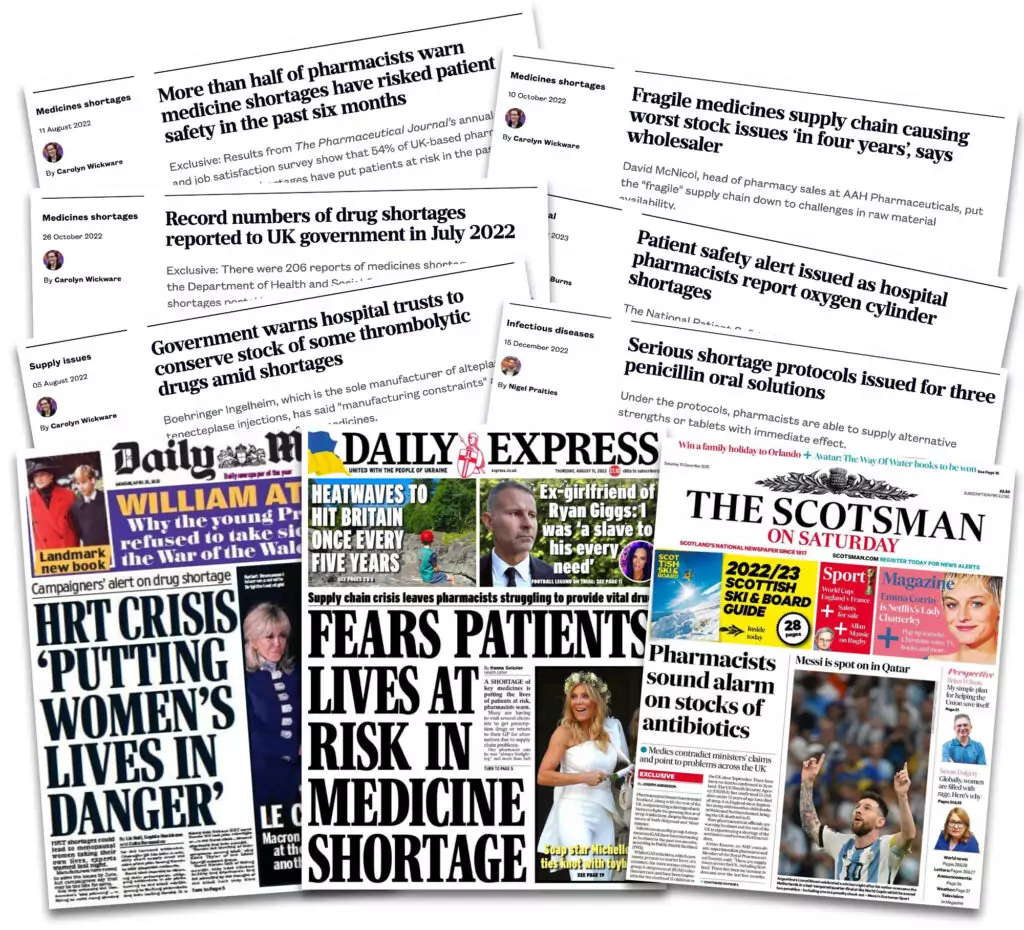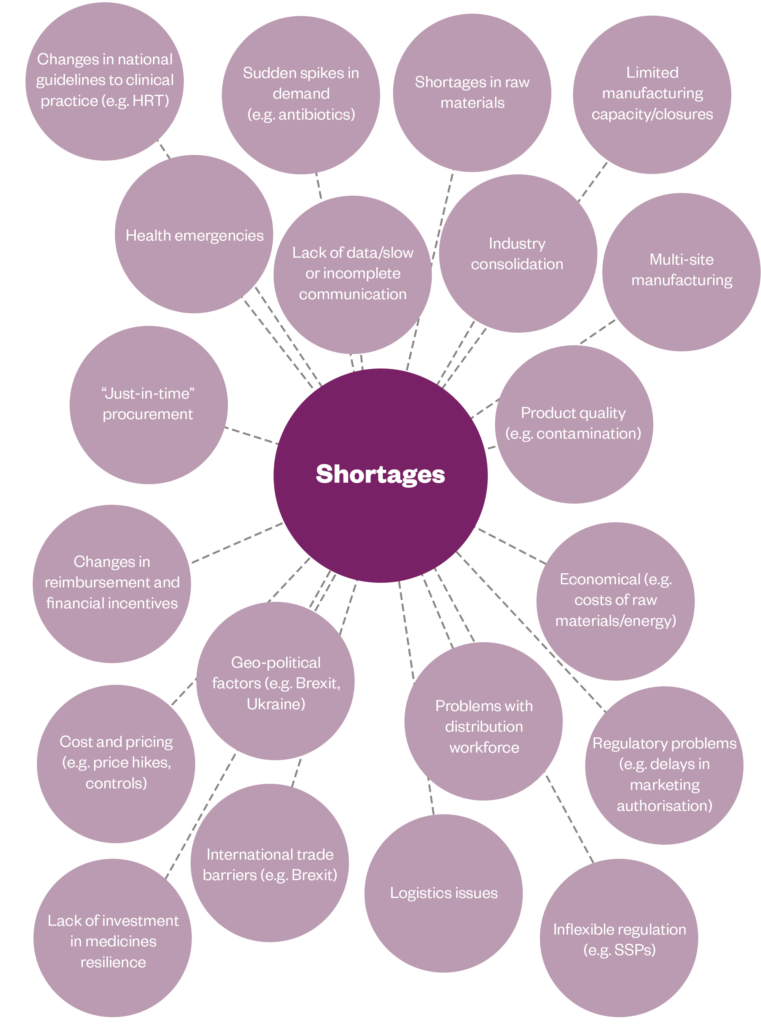Since early 2022, medicines shortages have hit the headlines on several occasions: many women have been impacted by ongoing shortages of hormone replacement therapy (HRT), which peaked in May 2022 and, in December 2022, parents were left scrambling to find antibiotics for their children amid outbreaks of strep A and scarlet fever.

The Pharmaceutical Journal/Various
Serious shortage protocols (SSPs) were first introduced in October 2019 as part of preparations for a ‘no-deal’ Brexit to allow pharmacists to offer an alternative product specified in the protocol for items in short supply. Since then, the Department of Health and Social Care has issued 56 SSPs, with the number of active protocols peaking at 9 SSPs in July and September 2022 (see Figure 1).
Patients put at risk
A rising number of pharmacists say that medicines shortages are putting patients at risk. The Pharmaceutical Journal’s 2023 salary and job satisfaction survey, which ran from 17 April to 1 May 2023, revealed that 902 out of 1,578 (57%) UK pharmacists working in all sectors of the profession answered ‘Yes’ when asked if medicines shortages have put patients at risk “in the past six months”, despite government efforts to try to mitigate problems.
This is a slight increase on the proportion of pharmacists (54%, 847 out of 1,562) who answered ‘Yes’ to the same question as part of The Pharmaceutical Journal’s survey in 2022.
Problems are particularly acute in community pharmacy, where two-thirds of respondents (67%, 256 of 381) said shortages have put patients at risk (see Figure 2).
Overall, a third of respondents (33%, 489 of 1,496) reported being “unable to supply a prescription item because of medicine shortages” to more than 10 patients per week, on average. Over half of community pharmacists (56%, 214 of 379) were unable to supply prescription items to more than 10 patients per week (see Figure 3).
Piling on the pressure
All of this is putting massive pressure on pharmacists, with those in community spending many hours sourcing alternatives. The survey revealed that 15% (235 of 1,570) of respondents said they were spending 6 or more hours per week on activities related to medicines shortages, with 22% of community pharmacists (84 of 381) doing so (see Figure 4).
It is clear from the survey results that the time and energy spent on medicines shortages is a huge source of stress for pharmacists, particularly those in the community, who are often stuck between concerned patients and GP practices, which can be difficult to communicate with. Of the 380 community pharmacist respondents who answered the question ‘Which of the following factors, if any, influence your stress levels at work?’, 82% (310) said medicines shortages (see Figure 5).
Reasons for shortages are multifactorial
There are many potential reasons for medicines shortages, including Brexit, the Ukraine–Russia war, the COVID-19 pandemic, soaring energy costs and inflation, logistics issues, and the availability of raw ingredients (see Figure 6).

The Pharmaceutical Journal research and expert interviews, 2023
However, the picture is complex and there are differing views on why shortages have increased over the past year. In a survey of 56 hospital pharmacists — two-thirds of whom were chief pharmacists — conducted by The Pharmaceutical Journal in March and April 2023, 85% (39 of 46) suggested geopolitical factors are playing a part, with 59% (27 of 46) citing contracting prices and 24% (11 of 46) saying COVID-19 (see Figure 7).
However, at a roundtable meeting hosted by The Pharmaceutical Journal on 19 April 2023 at the Royal Pharmaceutical Society’s (RPS’s) London headquarters, Ross Maclagan, distribution and supply chain policy manager at the Association of the British Pharmaceutical Industry, said he has “not personally seen significant issues of Brexit” in the supply chain, adding that “this is a global issue, not just a UK issue”.
Will shortages improve?
There are signs that shortages are improving, with the lowest number of SSPs active in June 2023 since January 2022 (4) (see Figure 8).
At the roundtable meeting, participants — including hospital chief pharmacists, medicines procurement pharmacists and pharmaceutical industry representatives — discussed ways in which medicines shortages could be managed going forward (see Box).
Box: Roundtable recommendations — the way forward for managing medicines shortages
- Information on shortages should be timely, accurate and accessible from a secure system that provides all the information needed in one place;
- There should be greater transparency and responsiveness around government contracts with suppliers to provide medicines, including offering parity to suppliers providing medicines;
- There should be centralisation of medicines stock, similar to the system in Wales, to help manage demand and forecasting, particularly for critical medicines that could be stockpiled by the government;
- Community pharmacists should be given more flexibility beyond the use of serious shortage protocols to make changes to prescriptions when the prescribed medicine is out of stock;
- The government should reconsider how manufacturers are incentivised for manufacturing supply since the price of generic medicines to the NHS is now lower than is sustainable for manufacturers to produce;
- The potential to use the NHS App to offer patients accurate and accessible information on shortages should be explored;
- A public facing ‘shortages tsar’ should be appointed to tackle issues in the supply chain;
- An app, similar to the Argos model, should be developed that shows availability of medicines in community pharmacy.



